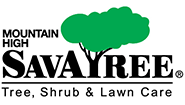The simple answer is…. grass turns brown when the roots can no longer absorb nutrients or water from the soil, or when the soil doesn’t contain enough food or water. There are several factors that can lead to a brown lawn or brown patches, here are the typical culprits:
 Drought/heat: During the heat of the summer, the average Front Range lawn needs 1.5 to 2 inches of water per week. During periods of high heat and low water, many turf grasses will go dormant when they don’t get enough water. This is a normal condition; barring insect or disease, the grass will recover when the temperature drops and/or rain resumes.
Drought/heat: During the heat of the summer, the average Front Range lawn needs 1.5 to 2 inches of water per week. During periods of high heat and low water, many turf grasses will go dormant when they don’t get enough water. This is a normal condition; barring insect or disease, the grass will recover when the temperature drops and/or rain resumes.
If it is necessary to let a lawn go dormant, it is best to keep it dormant. Applying enough water to pull it out of dormancy then cutting off the water again can cause long lasting damage and serious stress to the turf. To sustain a drought-dormant lawn; apply a half inch of water every two to three weeks during the drought. To green it up again, apply 3 inches of water over a week (you may have to water in short increments at first to re-saturate the soil) then resume normal watering or wait until temperatures drop and rain resumes, when it will turn green again on its own.
Sprinkler Coverage: One of the biggest reasons for brown areas is water related issues. If your lawn develops brown patches during the heat of summer; make sure your sprinklers are providing enough water and reaching all areas. The common signs of poor coverage are green areas around sprinkler heads with areas of brown outside of the green circle around the sprinkler head. Mountain High has sprinkler techs trained to correct any coverage issues.
Weeds: Common weeds will compete with your lawn for water and food. Because of deeper roots, the weeds often times win this battle. Controlling weeds is tricky; a lawn program that includes a pre-emergent herbicide in spring to prevent weed seeds from germinating is key to getting a good jump on grassy weeds like crabgrass and broad leaf weeds such as dandelions. Follow up weed control applications can keep a lawn weed free and allow the grass to take full advantage of the water and nutrients available. The best defense against weeds is a healthy root system.
Disease: There are a handful of common fungus problems that hit Front Range lawns. If your grass is covered with white, black, brown substances, from rings, or you have brown stripes, then lawn disease is usually the problem. Lawn disease problems should be diagnosed and treated by a lawn care professional. Mountain High can properly diagnose fungus problems in your turf and begin the process of a healthy lawn.

Insects: Chinch Bugs: These drought-loving bugs drain water right out of the grass. Some signs to look for are that your lawn will look wilted, then yellow, and eventually brown. Pull back a wilted patch and look for small fast moving black or grey bugs (1/32 to 1/5 inch depending on life stage) with white markings.
Grubs: These beetle larvae feed on turf roots and mimic drought damage. White grubs appear curled into a “C” shape are the most commonly seen. Sod Web Worm are larger and feed right where the root and plant meet at the ground, also called the crown. A brown lawn with lots of birds pecking at it is often times a good indication that you have grubs.
Bill Bugs: The larva of billbugs like to establish themselves close to concrete then move inward creating damage that progresses inward. The adult beetle has a hooked nose appearance which makes it easy to identify.
Turf damaging insect identification and control is a major part of the lawn department at Mountain High.

Pet waste: Round patches of dead grass with bright green taller grass around the dead areas indicate animal waste is causing the damage to your lawn. If you know a pet has a favorite spot, hand aerate and flush the area with water to dilute the waste. Revive can also help to reduce pet damage. Mountain High can provide a Revive program for your lawn to help with pet damage.
Mountain High’s team has the knowledge and expertise to help you maintain a healthy, green lawn. Call us at 303.232.0666 or send us an estimate request below:

